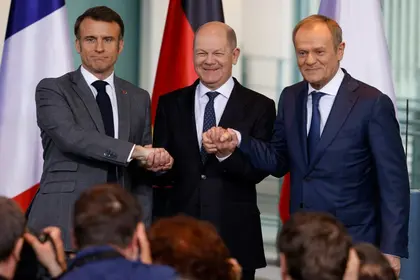Much of Europe has been talking about Russia as an “existential” threat. Expect the debate to now turn towards how to address this.
In somewhat Churchillian tones, French President Emmanuel Macron has started channeling aloud what many EU leaders, policymakers and military officials have been thinking since earlier this year: That to keep the peace, Europe needs to be ready for war.
JOIN US ON TELEGRAM
Follow our coverage of the war on the @Kyivpost_official.
“If we leave Ukraine alone, if we let Ukraine lose this war, then for sure Russia will threaten Moldova, Romania and Poland,” Macron repeated on Thursday (14 March).
Macron’s ‘conversion’ from dove to hawk on Russia’s invasion of Ukraine has been welcomed by Eastern Europeans, who have asked for this change for a long time. They are increasingly concerned by what a Russian advance this spring could bring.
Russia has now pushed its aggression to a whole new level and the Kremlin, he said, has in recent months “got noticeably harder-line”, placing the Russian economy on a permanent war footing; stepping up repression of internal opposition and escalating cyber-attacks on European countries.
Added to this is the already foregone conclusion of this weekend’s polls that Russia’s President Vladimir Putin will be in charge until at least 2030.
With the option of sending Western troops to Ukraine not being ruled out, and deliberately not drawing red lines, France is keeping strategic ambiguity towards Russia.

No More Russian Gas Through Ukraine – But What Happens Next?
How much of Macron’s new-found alarmism and positioning is purely politics and how much is actual commitment, the next weeks and months will tell. The problem is that there are too many people reacting badly to him and his ad-hoc proposals.
The comments were followed by a three-way emergency meeting with Germany’s Chancellor Olaf Scholz, to patch up increasingly broken relations, and Polish Prime Minister Donald Tusk, putting on the mandatory common front with Europe’s East.
After the meeting, the three countries of the so-called ‘Weimar Triangle’ were “united” in their aim, to “never let Russia win and to support the Ukrainian people until the end.”
How and until when remains an open question.
EU leaders in a few days will meet in Brussels to discuss further long-term military aid to Ukraine, the main questions on the table will be: Are we winning this war? and, Are we delivering enough support for Ukraine?’
Two years after Russia invaded Ukraine on 24 February 2022, Ukraine’s frontline has frozen, a tactical stalemate, with neither side having enough soldiers, weapons and especially ammunition to gain the upper hand.
European governments have previously said ‘no’ to lethal aid, tanks, missiles and fighter jets. But all of those have now been delivered (or are in the process of being).
“Given the urgency of the situation, the European Union is determined to continue providing Ukraine and its people all the necessary political, financial, economic, humanitarian, military and diplomatic support, for as long as it takes and as intensely as needed,” according to an early draft of their summit conclusions, seen by Euractiv.
“Russia must not prevail,” the draft text adds, spelling out efforts ranging from ammunition to using proceeds from immobilized Russian assets. They will also call for more sanctions against Russia’s supplier friends.
But the more interesting part, however, will be what comes out of the EU leader’s discussion that will not be on paper.
If the declared strategic goal is that ‘Russia must not win’, then to achieve that, options to react must be wider and nothing ‘taken off the table’, an increasing bunch of EU diplomats believe.
See the original of this article by Alexandra Brzozowski, Editor, Global Europe & Defence, Euractiv here.
You can also highlight the text and press Ctrl + Enter









